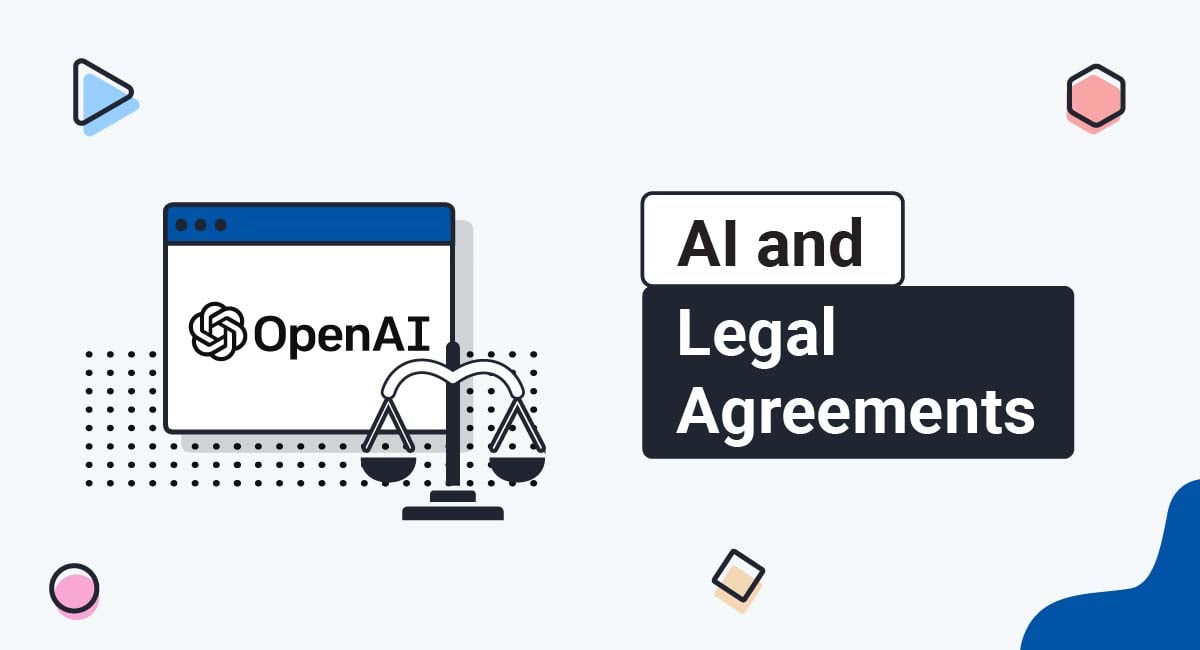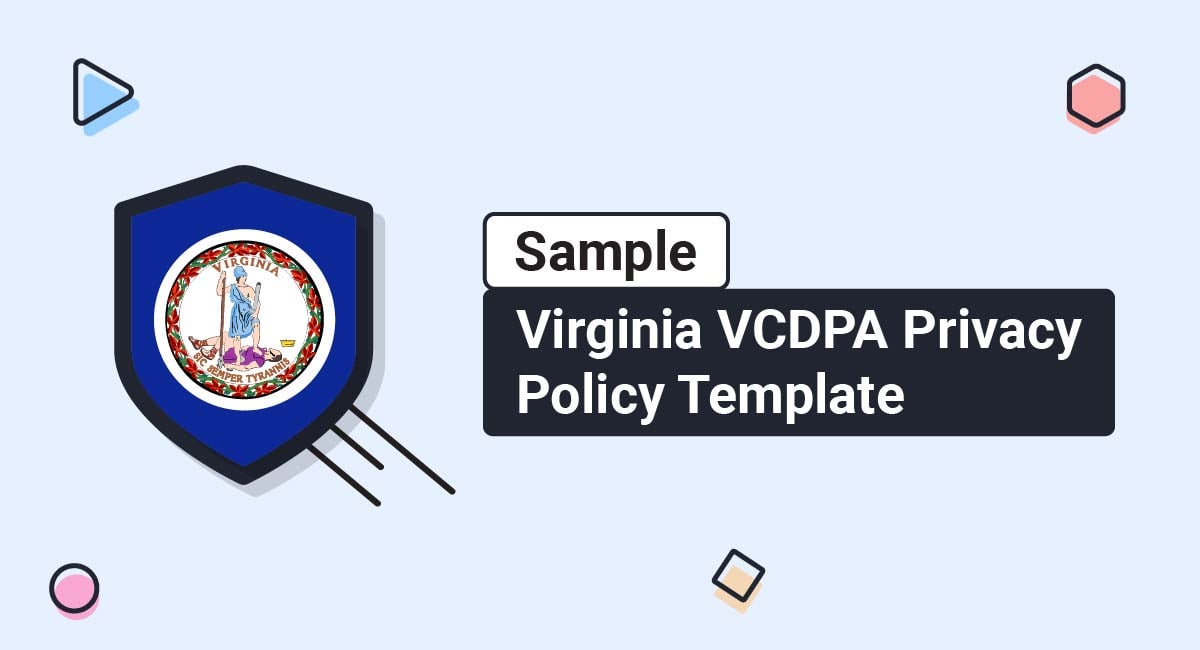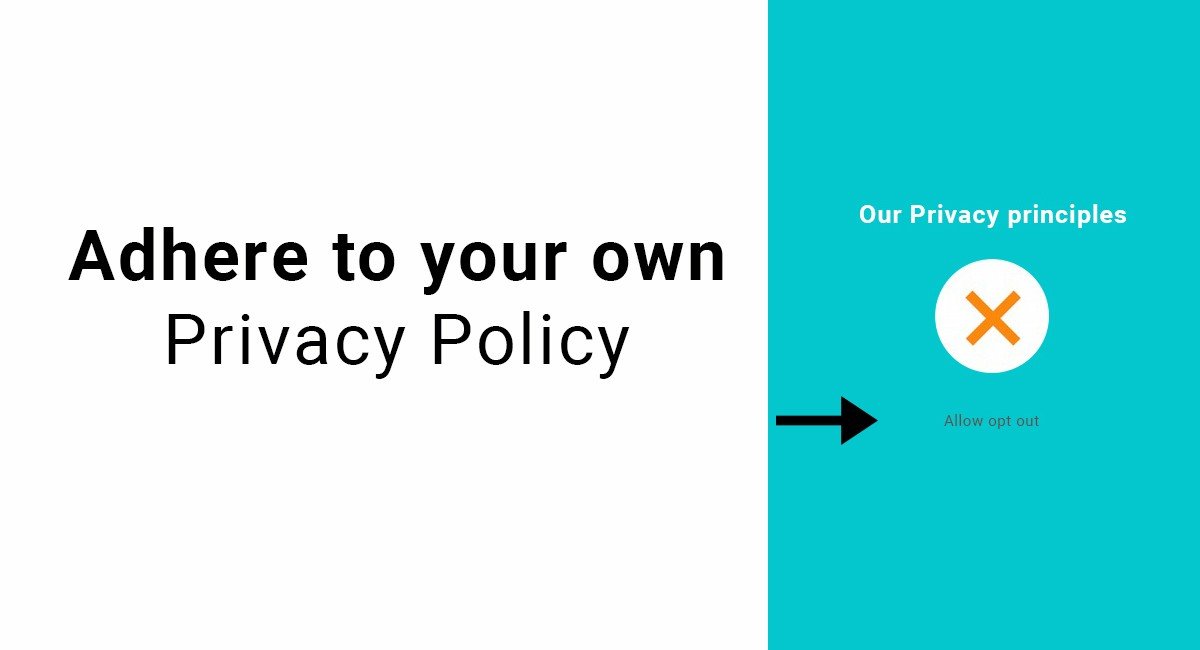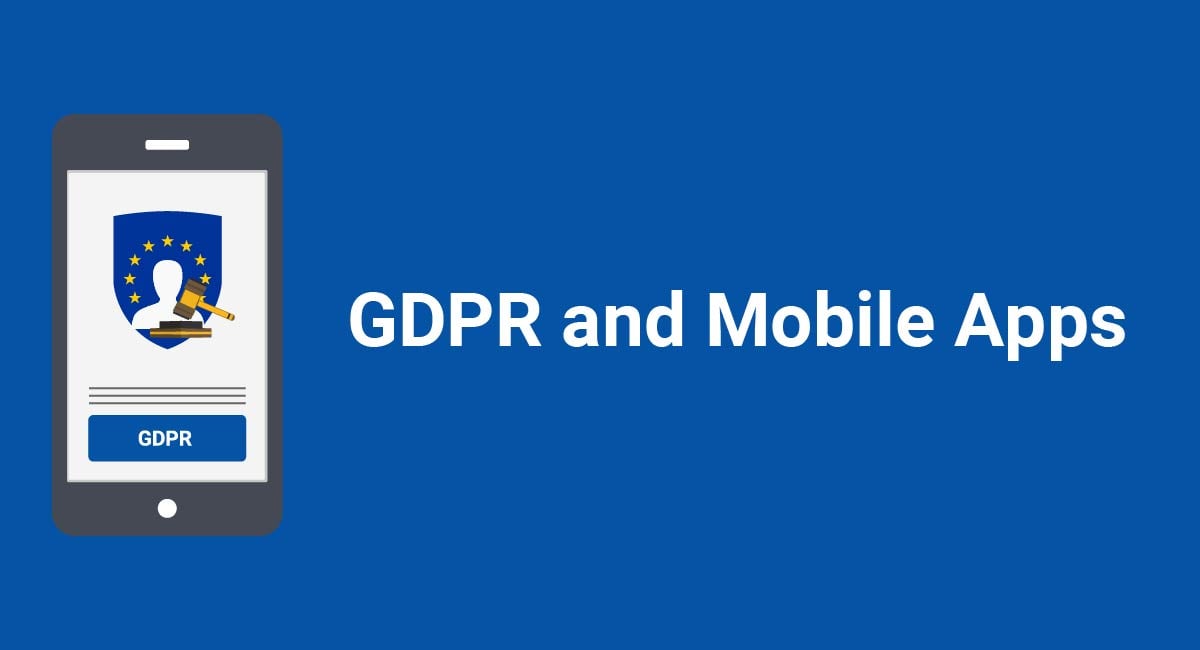Is it a good idea to use AI to create your legal agreements, such as Terms and Conditions agreements, Privacy Policies, EULAs, Cookies Policies, Return and Refund Policies, and Disclaimers?
We believe it is not a good idea, and this article will explain why.
We used a popular AI tool, ChatGPT, to draft a number of legal agreements, each of which came up short on quality, content and compliance.
Let's look at the results, and analyze why using AI to create legal agreements is not the best approach.
TermsFeed is the world's leading generator of legal agreements for websites and apps. With TermsFeed, you can generate:
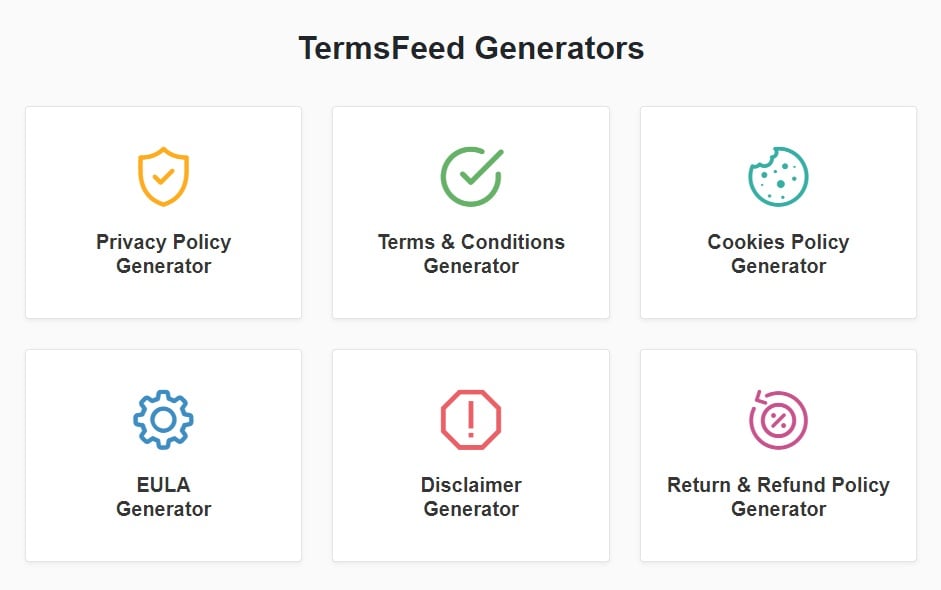
- 1. What is AI and ChatGPT?
- 2. What are the Disadvantages of Using AI to Generate Legal Agreements?
- 2.1. Gaps in Comprehensive Legal Understanding
- 2.2. AI's Inefficiency and Potential for Error
- 2.3. Lack of Tailoring to Specific Business Needs
- 2.4. Inefficiency in Time Investment with AI
- 3. Testing ChatGPT on a Variety of Legal Agreements
- 4. Test 1: Use ChatGPT to Write a Terms and Conditions Agreement
- 5. Test 2: Use ChatGPT to Write a Privacy Policy for a Website
- 6. Test 3: Use ChatGPT to Write an EULA Agreement
- 7. Test 4: Use ChatGPT to Write a Return and Refund Policy for an Ecommerce Website
- 8. Test 5: Use ChatGPT to Write a Cookies Policy for a Website
- 9. Test 6: Use ChatGPT to Write an Affiliate Disclaimer
- 10. What are Some Better Options for Crafting Your Legal Agreements?
- 11. Summary
What is AI and ChatGPT?
ChatGPT, developed by OpenAI, is a popular and commonly used platform. The term 'GPT' stands for Generative Pretrained Transformer, which refers to expansive language models (LLMs).
These LLMs employ intricate, deep learning techniques, mirroring human cognitive processes, to hone ChatGPT and enable it to produce an array of written content, emulating human language and tone.
What are the Disadvantages of Using AI to Generate Legal Agreements?
AI might seem like a convenient and modern choice to use when creating your legal agreements.
However, navigating the world of online legal agreements requires precision, expertise, and a deep understanding of both your business and legal requirements. ChatGPT, although technologically advanced, still presents challenges in crafting these complex agreements effectively.
Gaps in Comprehensive Legal Understanding
While AI platforms may hold vast data up to their last update, their knowledge isn't consistently refreshed to mirror evolving legal landscapes. In contrast, platforms like TermsFeed ensure that their legal templates and generators are updated regularly by professionals and reflect ever-changing legal requirements and standards.
AI's Inefficiency and Potential for Error
AI's shortcomings, notably in terms of precision and understanding, can be alarming. Although ChatGPT can provide a general framework, human intervention becomes vital to review, restructure, and validate the content for coherence and legal integrity.
Pre-designed templates, curated by legal professionals, inherently carry the benefit of human discernment, often encapsulating the vast majority of business scenarios and ensuring content is neither biased nor inappropriate.
Lack of Tailoring to Specific Business Needs
AI tools cannot inherently understand the intricacies specific to your business operations. This includes understanding specific legal mandates that apply to your domain, data processing nuances, third-party collaborations, and the specifics of international data transfers.
ChatGPT essentially amalgamates various existing online legal documents, often leading to a generic and non-specific output. This methodology can miss out on key clauses or include irrelevant sections, leaving you at potential legal risk if you're not well-acquainted with the laws governing these agreements.
In contrast, specialized legal document generators are designed with these specifics in mind, offering a more streamlined and less error-prone solution.
Inefficiency in Time Investment with AI
After ChatGPT creates a legal agreement, much time must go into rectifying potential errors, reviewing laws to make sure compliance has been met, and customizing the agreement to your unique business. This can be far more time-consuming than utilizing a dedicated legal agreement generator.
While AI can offer broad guidelines, the intricate and crucial nature of your business's legal agreements necessitates a more specialized, human-informed approach to ensure accuracy, compliance, and peace of mind.
Testing ChatGPT on a Variety of Legal Agreements
We used ChatGPT to create the following legal agreements:
- Terms and Conditions agreement
- Privacy Policy
- EULA
- Return and Refund Policy
- Cookies Policy
- Affiliate Disclaimer
Below is the test number, and the specific prompt used for that test:
| Test | Prompt for ChatGPT |
| #1 | Write a Terms and Conditions Agreement for a Website |
| #2 | Write a Privacy Policy for a Website |
| #3 | Write an EULA Agreement |
| #4 | Write a Return and Refund Policy for an ecommerce Website |
| #5 | Write a Cookies Policy for a Website |
| #6 | Write an Affiliate Disclaimer |
Test 1: Use ChatGPT to Write a Terms and Conditions Agreement
In this first test, the result was a generic Terms and Conditions agreement.
It includes a disclaimer that encourages the user to consult with a legal professional:

Here's the full version of the completely generic Terms and Conditions agreement that ChatGPT generated:
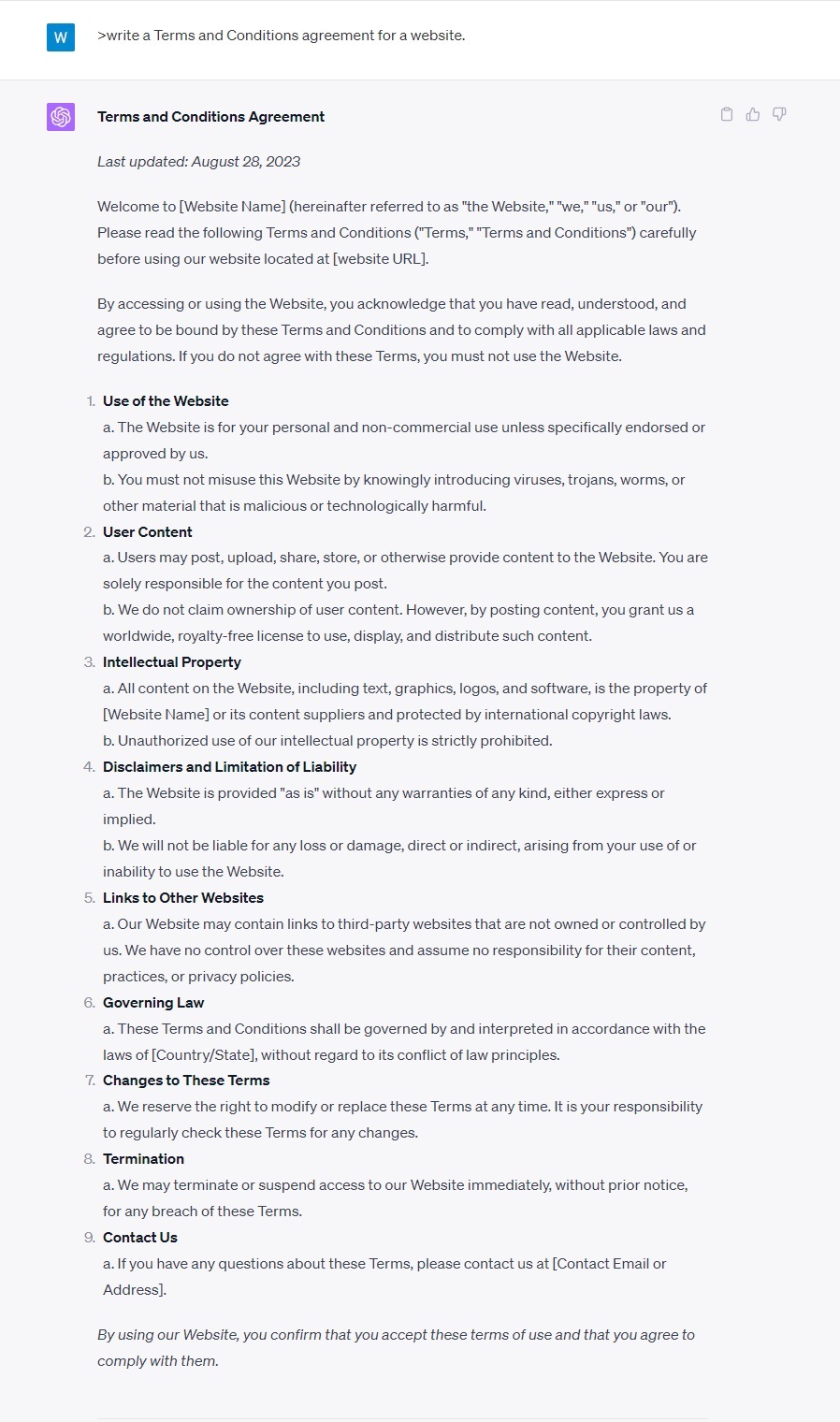
ChatGPT falls short when crafting detailed and tailored Terms and Conditions for specific businesses. It often starts with generic templates that don't capture the unique offerings or nuances of individual businesses.
For instance, while it may touch upon intellectual property rights, it may not go deep enough in addressing specific consequences of infringements pertinent to a niche. When handling user content clauses, ChatGPT might not be explicit about the duration or exact purposes for which content can be used.
On the topic of liability, it might generalize, missing out on specifics like consequential or incidental damages. Termination criteria and processes might be presented in a broad manner, and jurisdictional clauses might lack the precision needed for particular regions or industries.
With all that in mind, it's important to understand that while ChatGPT is a powerful tool, for intricate legal documents like Terms and Conditions, human expertise and customization are necessary.
As a business leader, you must understand that your Terms and Conditions go beyond mere legal jargon. They epitomize your brand, outline your operational guidelines, and convey your appreciation for your customers. They also help ensure you maintain a level of control over your business.
Opting for generic terms generated by AI might be tempting, but it's almost certain to miss crucial nuances specific to your business.
Test 2: Use ChatGPT to Write a Privacy Policy for a Website
Just as with our test for a Terms and Conditions Agreement, ChatGPT fell short when we asked it to write a Privacy Policy for a Website. The AI also presented a disclaimer in the same way:

See ChatGPT's full output below:
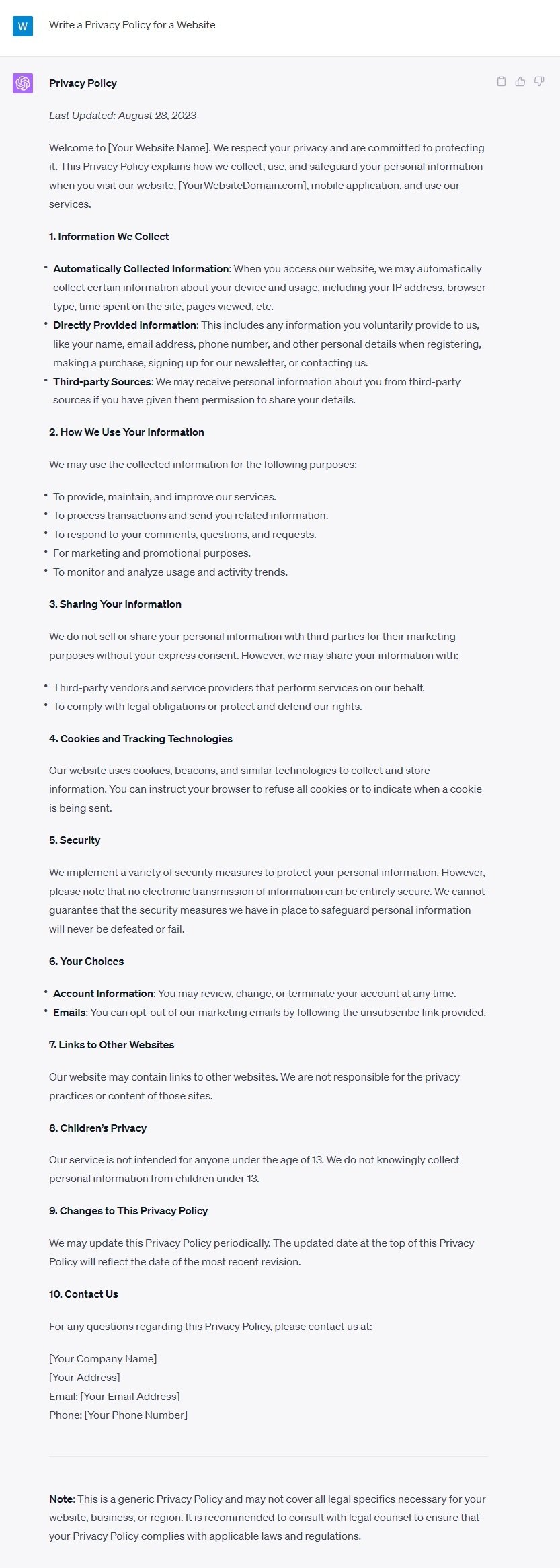
When analyzing ChatGPT's attempt at crafting a Privacy Policy, several areas of concern emerge.
First, the model's description of "Automatically Collected Information" tends to be generalized, often omitting specifics about the exact types of data collected and their retention periods. This information is important for legal compliance.
This broad approach also spills over to its mention of "Third-party Sources," where it lacks detail on which third parties a business may be engaged with or the nature of the shared information. This creates potential ambiguities.
When detailing the "Usage of Information," ChatGPT might list various purposes but might not always align them with specific lawful bases, which is a cornerstone for GDPR compliance.
The policy's section on "Sharing Information" demonstrates a similar vagueness by generically referring to "third-party vendors," missing out on the granularity businesses might require.
In addressing "Cookies and Tracking," ChatGPT might fail to encompass the wide array of tracking technologies, possibly leaving gaps.
And since ChatGPT doesn't inquire, it can't pinpoint the specific laws applicable to your venture. This means that relying on this method to formulate a Privacy Policy requires you to navigate various data protection laws and pinpoint those that apply to you. Then, you'd need to refine your Privacy Policy by adding necessary sections and details to ensure it's in line with the identified regulations.
Effectively, you're building the entire content from scratch. An alternative would be to use a pre-structured Privacy Policy template from trusted platforms like TermsFeed, which is both adaptable and time-efficient.
Test 3: Use ChatGPT to Write an EULA Agreement
When we asked ChatGPT to produce an End User License Agreement, it once again ensured there was a disclaimer concerning its output:

See ChatGPT's full output below:
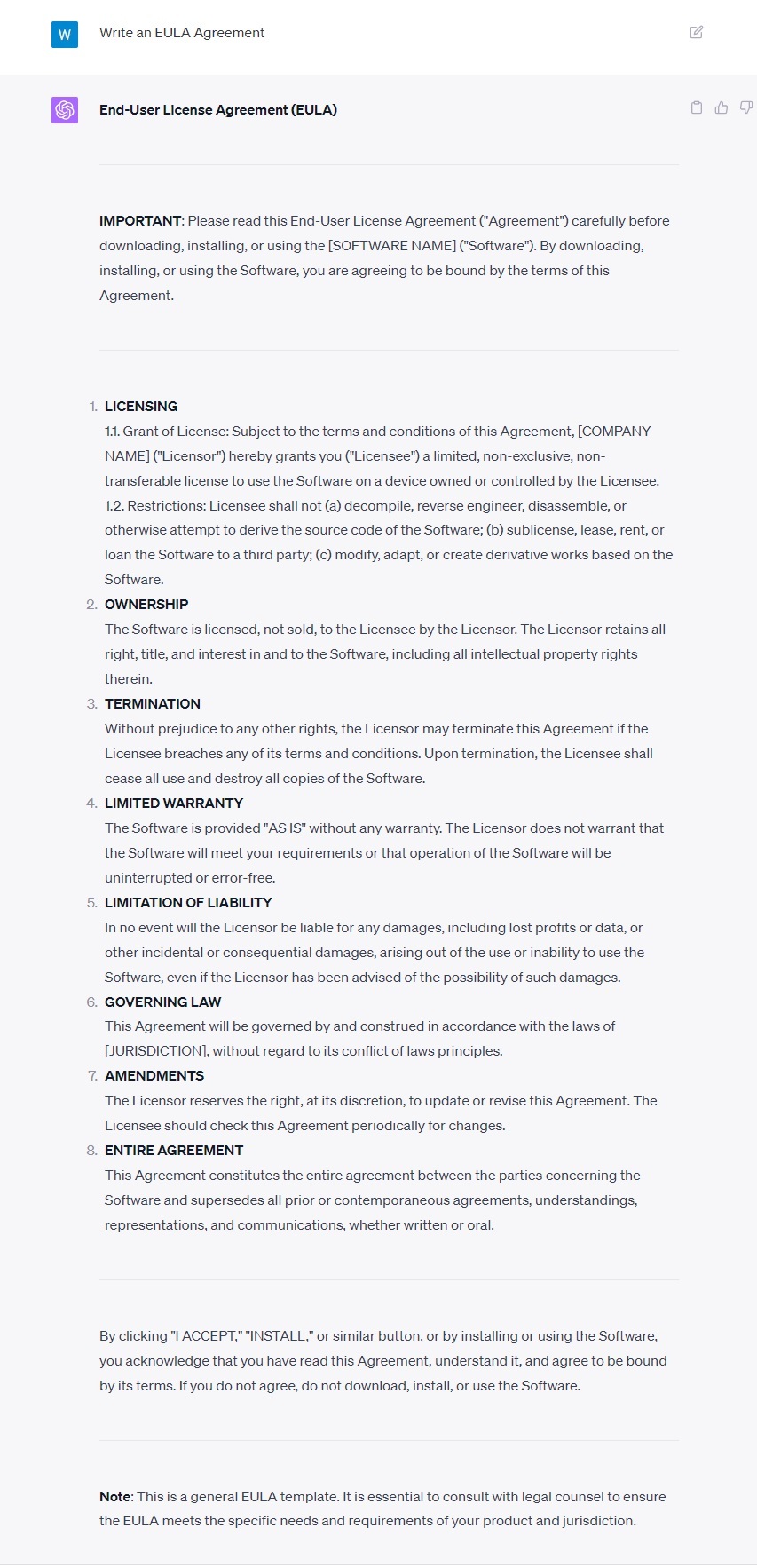
From a legal standpoint, the EULA template generated by ChatGPT offers a basic framework but has some key areas that might raise concerns.
First, the "Licensing" section lacks a specification on the duration of the license. Is it perpetual or for a set term? Without clarity, future disputes might arise.
The "Restrictions" segment also doesn't provide for any exceptions, like permitted reverse engineering under specific circumstances.
In the "Limited Warranty" section, the assertion that the Software is "As Is" is rather broad, potentially failing to cover implied warranties depending on jurisdiction. Similarly, "Limitation of Liability" should be crafted with care, as outright disclaimers may not always be enforceable.
The "Governing Law" section should also specify if it's exclusive jurisdiction or not.
Finally, the "Amendments" clause implies the Licensor can change the Agreement unilaterally - best practice would require notice and an acceptance mechanism for substantive changes.
The bottom line is that EULAs, as with other legal agreements, must be meticulously tailored to the nuances of the software and the business landscape in which they operate.
Test 4: Use ChatGPT to Write a Return and Refund Policy for an Ecommerce Website
Interestingly, the very first thing we noticed here is that ChatGPT didn't include a disclaimer with its ecommerce Return and Refund Policy that it wrote. This shows that the AI is not entirely consistent in its output.
Here's the full text of the policy it generated:
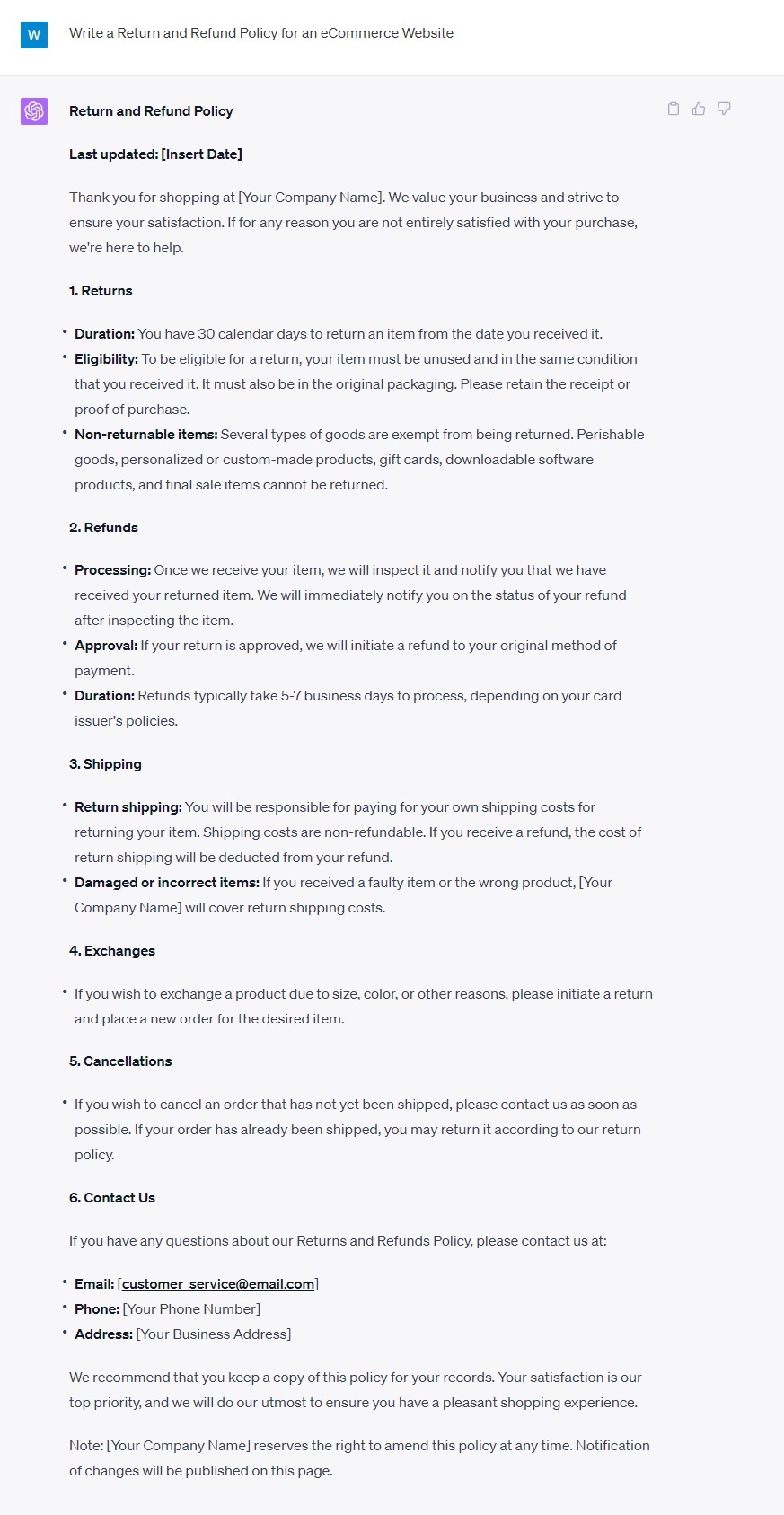
The Return and Refund Policy that ChatGPT created provides a general outline, but as with every agreement it has generated so far, it lacks specificity for legal protection. For instance, the "Eligibility" clause vaguely states items should be "unused" and in the same condition received - this could benefit from clearer definitions.
The "Refunds" clause implies an automatic deduction of shipping costs from all refunds, but it might be more equitable to conditionally apply this based on reasons for a return. Additionally, the "Exchanges'' section doesn't state if the exchanged item is subject to shipping fees.
In the "Cancellations" section, the policy lacks clarity on potential restocking fees. Furthermore, the "Contact Us" section should highlight a timeframe for responses. When should users expect a response?
You can see how this AI-generated policy is lacking in many important details.
Test 5: Use ChatGPT to Write a Cookies Policy for a Website
For this test, we asked ChatGPT to write a simple Cookies Policy.
An interesting thing during this test was the fact that the resulting output included a disclaimer that didn't just say it was "generic" but that it was "provided for general informational purposes only:"

Here's the full Cookies Policy as written by ChatGPT:
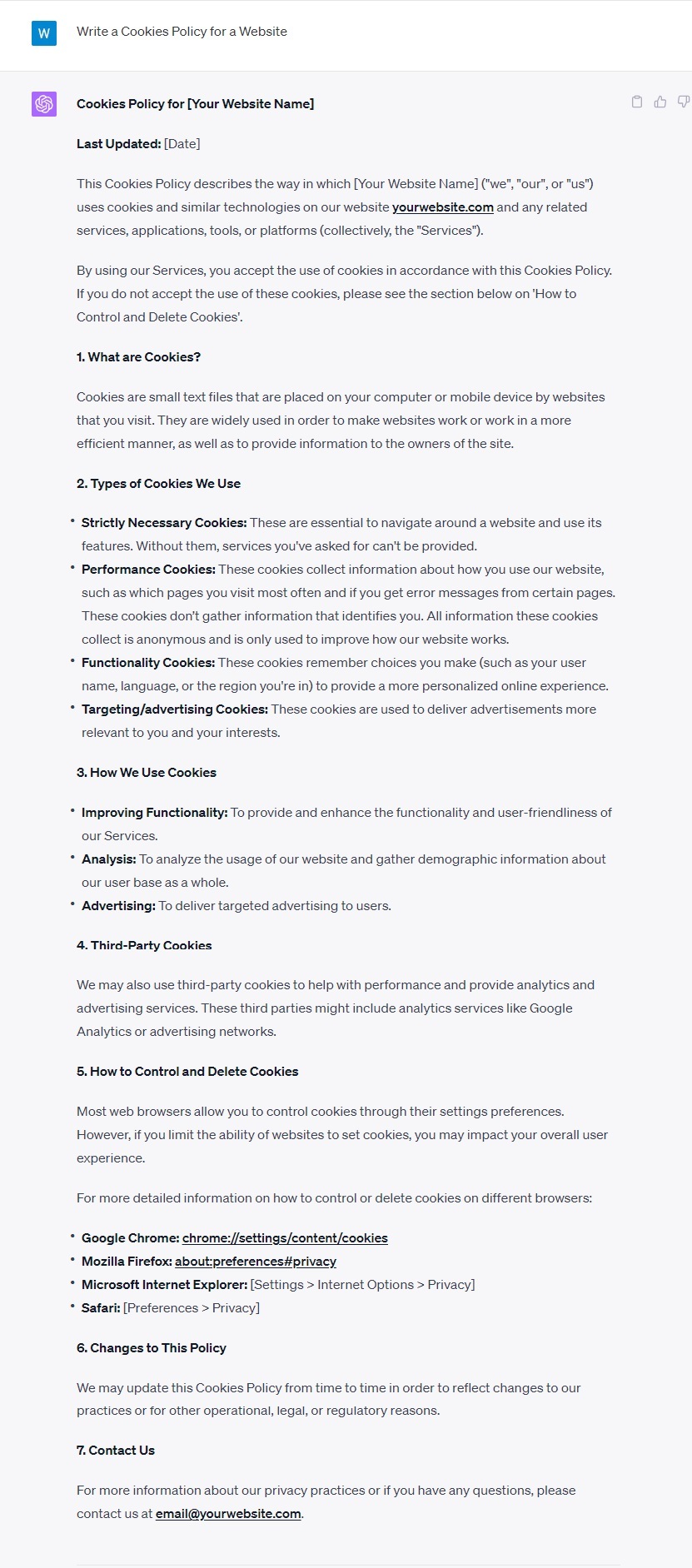
As with all the other agreements, ChatGPT provided a basic framework for a Cookies Policy. However, in line with everything we saw in previous tests, several gaps were revealed that probably won't serve the unique demands of your business.
For example, its ambiguous phrasings can lead to potential misunderstandings or liabilities. An absence of specificity, such as which particular cookies your site employs or which third-party services are in play, can be a cause for concern.
Moreover, a generic guide on browser settings without detailed instructions could mislead your website users. And, without a clear jurisdiction clause, you leave your business vulnerable in the event of legal disputes.
Test 6: Use ChatGPT to Write an Affiliate Disclaimer
For this test, we generated an affiliate disclaimer.
Here, as with the ecommerce Return and Refund Policy, the AI did not include any kind of disclaimer of its own regarding its output.
Here's ChatGPT's affiliate disclaimer in full:
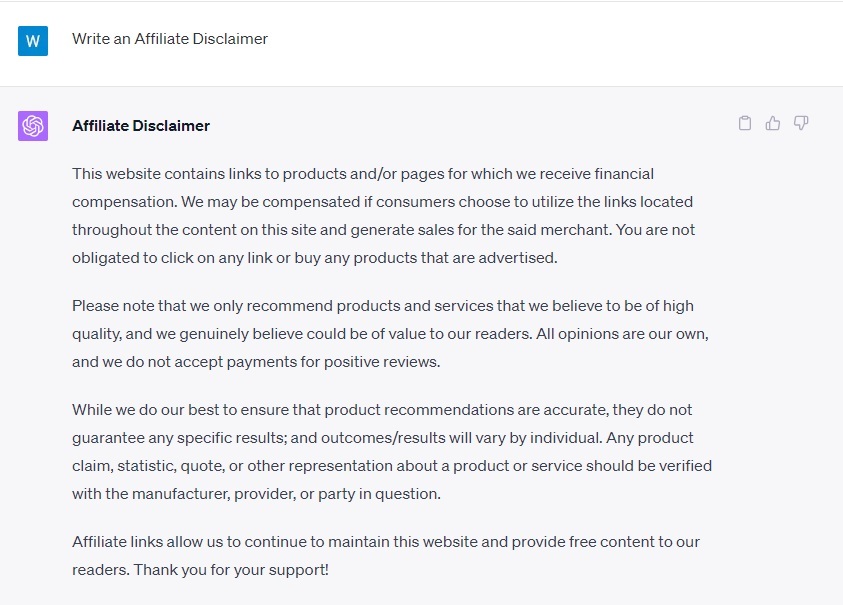
The disclaimer, while not being bad, does lack personality, specifics, and anything that would set it apart from the rest. And this is good when writing an affiliate disclaimer, as it will help people understand why you plan to make money off of them.
For businesses, especially in sensitive areas like legal disclaimers, a customized, human touch, ideally with professional legal guidance, becomes essential.
What are Some Better Options for Crafting Your Legal Agreements?
When considering creating the legal agreements your website needs, turning to specialized tools becomes not just convenient but essential.
TermsFeed stands out in this regard, offering templates and generators tailored for a range of agreements, from Terms and Conditions and Privacy Policies to EULAs and Cookies Policies.
Instead of generic or AI-generated content, TermsFeed's solutions ensure that you receive personalized, legally-compliant drafts based on your distinct business needs.
Created by experts in data privacy and product engineering, these documents are designed to align with multiple major data protection regulations. As laws evolve, TermsFeed remains vigilant, updating its offerings accordingly.
For entrepreneurs managing websites, apps, ecommerce platforms, or SaaS businesses, the beauty of TermsFeed lies in its efficiency. Within minutes, you can have a comprehensive, tailored agreement ready for download in formats like HTML, DOCX, Plain Text, or Markdown.
Need to incorporate custom text or clauses? The Live Editor provides seamless editing capabilities. What's more, as legal landscapes shift, TermsFeed notifies you whenever it's time to update your legal policies.
Summary
When it comes to drafting your legal agreements, we do not recommend using AI.
Using AI will give you a generic legal agreement that is lacking in any customization and personalization. It also may or may not be legally compliant with laws that you're required to follow.
The choice between using an AI tool like ChatGPT or a dedicated, professional platform like TermsFeed becomes evidently clear. Stick with the professionals and not AI.

Comprehensive compliance starts with a Privacy Policy.
Comply with the law with our agreements, policies, and consent banners. Everything is included.
